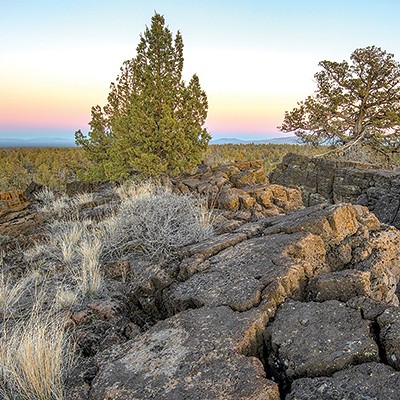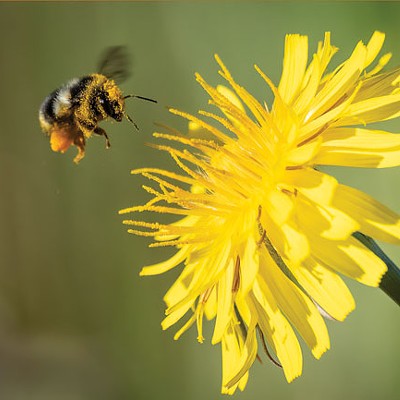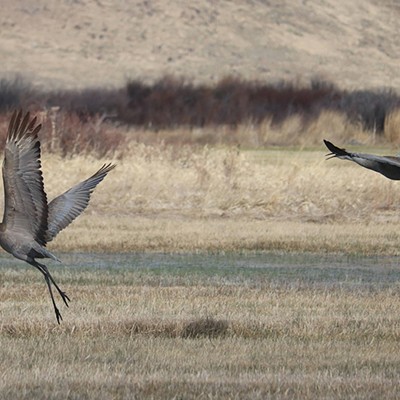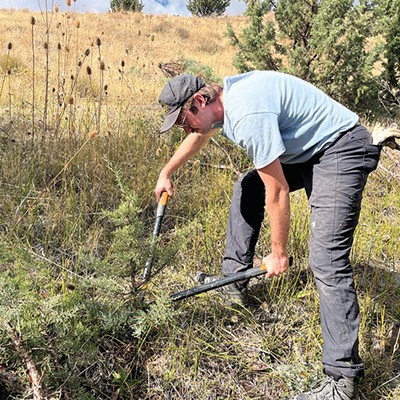As we come into spring and our landscape tasks, it is timely to review what products we will be using to make our landscape happy, beautiful and safe. For aesthetic purposes, pesticides are widely used on lawns, landscapes and open space. Many of these chemicals harm human health and the environment with both immediate and long-term effects. More and more research has indicated detrimental effects with even smaller dosages than previously thought.
What is a pesticide?
A pesticide is any chemical poison or biocide that make compounds toxic to certain species, whether it be insects, weeds, molds or animals. Unfortunately, pesticides frequently have off-target impacts. Even in low dosages, some still show toxic effects on brain and nervous systems, and human endocrine systems. These chemicals do not only stay in the areas where they are applied. Rather, they can be spread by wind, water and animals to neighboring areas as well as carried on workers' clothing. They can contaminate our environment in unanticipated ways and with unanticipated consequences.
We normally think of a pesticide as a product that can be purchased in a store, but... the product is actually a mixture including active and inert ingredients. These break down, eventually into other materials—some of which are actually more toxic than the parent material. Currently, under federal law only the active ingredient in a pesticide is required to be listed. Inert ingredients are not listed, but many are known to be hazardous to human health. (ex. Creosols are "hazardous waste" under superfund regulations, yet allowed to be listed as inert ingredients in pesticides.) New research is showing that most pesticides (including some disinfectants) act on the respiratory system, giving adverse inflammatory responses and impairing human immune and nervous systems. A serious cumulative and in some cases synergistic effect may occur, worsening that disease outcome. As more evidence of negative impacts has accumulated, the need for effective control of their use has become clear as does the need for safer alternatives.
Who oversees and regulates pesticides?
Many government agencies regulate pesticides: U.S. Department of Agriculture and the Food and Drug Administration. In Oregon: the Oregon Department of Agriculture, Oregon Department of Forestry and OSHA, among them. Oregon State University Extension runs safety programs for farm workers (among other things). In some situations, these agencies are working with outdated information. Laws are sometimes based on political and economic reasons, rather than science.
How current are Oregon's pesticide regulations?
Oregon, by law, has a list of "low-impact pesticides" (ORS 634-705). This list exempts use of products that are carcinogenic but only from these dated guidelines (from EPA 1986 Guidelines) or (EPA 2003 Draft Guidelines). Sadly, this information list has guidelines that are no longer used by EPA and are 20-30 years outdated. Some pesticides that EPA considers "safe" in some respects have been banned outright by European countries or the World Health Organization. The current Oregon "low-impact list" simply doesn't capture the best available science. With these problems, it might be safest to use pesticides from a factsheet for organic compatibles2 or comparable lists.
Some pesticides that EPA considers “safe” in some respects have been banned outright by European countries or the World Health Organization. The current Oregon "low-impact list" simply doesn’t capture the best available science.
tweet this
We need safer alternatives.
The Oregon League of Women Voters has published a whitepaper on "Pesticides and Other Biocides." It gives a history of pesticides as well as suggestions for the future, including improved training, education and applier's certification in Oregon. Currently, individuals doing primarily non-commercial landscape work are exempt from needing certification to apply pesticides (many do, but many don't). Until the law is changed, it would be wise to make sure any landscaper is certified if they apply pesticides.
Bend Park and Recreation District does not use neonictinoids and uses essential oils for control of pests. They use hand-pulling, string trimming and mechanical edging. Glycophosphates are limited to tree wells, borders and fence lines. Playgrounds and community gardens are never sprayed with pesticides. This is a great model for homeowners.
Let's make Central Oregon better and safer. Protect our health, our pets and our pollinator friends in making safer choices.
Lots more information is available on the factsheet, "Health Effects of 40 Lawn Pesticides," found at beyondpesticides.org.
Some ideas for Least Toxic Control of Weeds:
• Consider least-toxic pesticides as a last resort.
• Have healthy soil, use mulch and compost, minimize high nitrogen commercial fertilizers. Healthy lawns won't have as many weeds.
• Use native turfgrass like Buffalo Grass or EcoMix that use half the water.
• For pre-emergents, instead of chemicals, use a corn gluten product, which inhibits weed germination but also is a nitrogen-rich source.
• Hand-pull weeds when the ground is moist.
• For a small area, use boiling water.
• Herbicidal soaps, like those with Neem oil, can help control aphids. "Scythe" works on broadleaf weeds and moss. Diatomaceous earth works on slugs and snails.
• Horticultural vinegar is effective on certain weeds.
• For larger acreage or farms, use goats to keep down weeds; grass is their last food preference.
• Read labels, words like "total control," "long-lasting," "year-long" and "weed and feed" indicate the product contains more toxic chemicals.
























